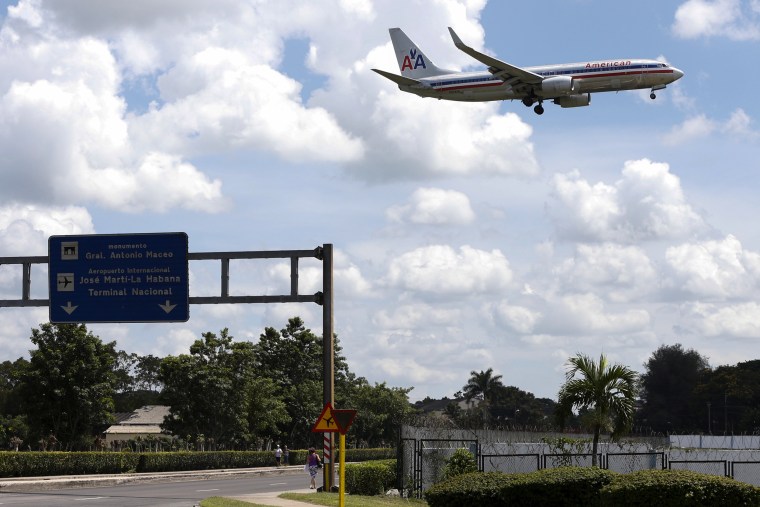CORAL GABLES, Fla. — A lawsuit against American Airlines and LATAM Airlines group was filed Wednesday, in a Miami federal court, for “trafficking” in Cuban property expropriated after the 1959 communist revolution.
The suit filed on behalf of José Ramon López Regueiro alleges the airline has been using Havana’s José Martí International Airport — which belonged to his father — without compensation.
This is one of several suits that have been filed after the Trump administration implemented Title III of the 1996 Helms Burton Act. The law allows the original owners of Cuban properties confiscated six decades ago to sue companies “trafficking” in them for three times their current value.
López Regueiro said during a news conference that his decision to sue was not monetary but rather for “justice.”
“I have had to wait 60 years, unfortunately,” López Regueiro said. “But at the end, there will be justice.”
He said his family’s properties were taken “violently” and his family was never compensated but rather “defamed.”
López Regueiro, 66, left Cuba for Holland in 1989 and later Spain where he worked in construction. He moved to Miami in 2009 and is now retired.
“What we seek to recover is the value of the airport times three,” said attorney Andrés Rivero, of Rivero Mestre LLP, who is handling the lawsuit. He estimates the current value of the airport at hundreds of millions of dollars, “approaching 1 billion,” he said. That means Regueiro could potentially receive up to $3 billion.
The lawsuit also seeks for the airline to cease operating at José Martí International Airport.
Rivero said that there are more than 50 airlines operating at the airport and they have sent letters notifying the companies of their intent to sue.
Rivero Mestre has filed six other lawsuits on behalf of other plaintiffs against international companies such as Spanish hotel chains Meliá and Barceló, as well as Canadian hotel company Blue Diamond.
An American Airlines spokesperson stated via email that airlines are exempted from Title III lawsuits.
"American Airlines' service to Cuba including José Martí International Airport in Havana is authorized by the U.S. government including the Department of Transportation and the US Office of Foreign Assets Control," an airline spokesperson said in an emailed statement. "In addition, Title III specifically exempts lawful travel, which is what American provides. We’ll review this lawsuit in detail and vigorously defend our service to Cuba."
There are around 6,000 claims that were certified by the U.S. government in 1996 and have been eligible to sue since Title III was enacted May 2. Those with non-certified claims, like López Regueiro, who were not U.S. citizens at the time their assets were expropriated, must first send a letter to the company detailing their intent to sue. If the company doesn’t respond within 30 days, then legal action can be taken.
Few lawsuits have been filed so far, in comparison to the flood of legal action that was initially predicted. The first one was filed in May against the U.S. cruise company Carnival by the heirs of the ports in Havana and Santiago de Cuba.
The Trump administration said it allowed Title III to go into effect because of Cuba’s role in Venezuela. The U.S. has accused Cuban troops of propping up embattled Venezuelan President Nicolás Maduro.
Allowing Title III to go into effect was opposed by Canadian and European Union allies, whose businesses have billions of dollars in investments in Cuba.
Follow NBC Latino on Facebook, Twitter and Instagram.



